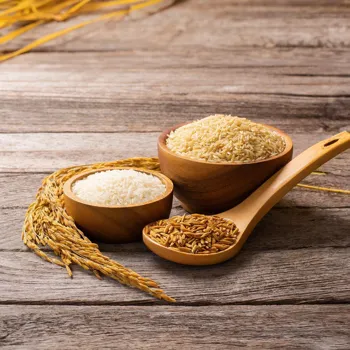Unveiling the Power of a Balanced Diet: Essential Components to Fuel Your Well-being. Dive in to transform your health!
In today's fast-paced Bharat, where everyone is chasing deadlines and juggling multiple
responsibilities, it's easy to let our eating habits slide. But hold on a minute!
What we put into our bodies is the fuel that keeps us going, and a balanced diet is the superhero cape that can make us feel energetic, healthy, and ready to conquer the world. A balanced diet is very important for our well-being, to stay active and productive.
So, what exactly is a balanced diet, and why should we care? Think of it as a customized plan that gives your body exactly what it needs to work its best. It's like giving your car the right kind of petrol and doing regular maintenance – it ensures smooth sailing in the long run.
It involves eating the right amounts of different food groups, including carbohydrates, proteins, fats, vitamins and minerals which are vital for proper body fuction. A balanced diet is about eating a variety of foods in the right proportions, to ensure all our nutritional needs are met.
The Power of Fruits and Vegetables
Think of fruits and vegetables as nature's colorful candies, packed with vitamins, minerals, and fiber. They are like the little soldiers protecting your body from sickness and keeping your skin glowing. From juicy mangoes to crunchy carrots, try to include a rainbow of colours in your daily meals.
Aim for at least five servings a day – it's easier than you think! They are low in calories and rich in nutrients. Adding fruits and vegetables to every meal is a great way to boost your health and energy levels.
This component is very vital in our diet.
Some of the benefits are: reduced risk of chronic diseases like heart disease and type 2 diabetes because many fruits and vegetables are high in antioxidants, which help protect cells from damage.
Fruits and vegetables are low in calories and fats and they helps in weight management by making you feel full and satisfied, supporting healthy digestion and are a great source of fiber, which aids digestion and prevents constipation.
Whole Grains: The Energy Providers
Forget those refined white breads and pastas! Whole grains like wheat, rice, and oats are the real deal. They provide sustained energy, keeping you feeling full and focused throughout the day. Think brown rice instead of white rice, wheat roti, ragi dosa instead of maida.

They're also packed with fiber, which is great for your digestion. Starting your morning off with a wheat breakfast is a fantastic way to power up your day. These are essential for sustained energy and overall health.
The benefits of whole grain include steady energy levels which provides a slow and steady release of energy, preventing energy crashes. Helps in weight management, as the fiber in whole grains helps you feel fuller for longer, aiding in weight control.
Promotes heart health by lowering cholesterol levels, protecting against heart problems.
Protein: The Building Blocks
Protein is the essential component for building and repairing body tissues, making it super important for growing kids and active adults. Think dal, chana, tofu, and paneer. These are excellent vegetarian sources of protein.
Protein also keeps you feeling full, which can help you avoid unhealthy snacking. So, load up on protein to stay strong and healthy. This macro-nutrient is very important for muscle growth, repair and overall body function.
The benefits of protein include it being essential for building and repairing body tissues, including muscles, skin, and hair. Protein helps you feel full and satisfied after meals, which can aid in weight management.
Protein is needed to produce enzymes and hormones that regulate various bodily functions.
Healthy Fats: The Good Guys
Not all fats are bad! Good fats, like those found in nuts, seeds, and avocados, are essential for brain function, healthy skin, and overall well-being. Just remember to consume them in moderation. Good fats help your body absorb vitamins and keep your heart healthy.
Add a handful of nuts to your daily snack, or drizzle some sesame oil over your salad for a tasty and nutritious boost. They are an essential component for brain function.
Some of the benefits of healthy fats are it supporting brain health and cognitive function.
It also helps in healthy skin and hair. Good fats are essential for the absorption of certain vitamins, such as vitamins A, D, E, and K.
Calcium: For Strong Bones
Calcium is the mineral that keeps your bones and teeth strong. Dairy is a great source of calcium. Other Calcium rich food includes green leafy vegetables like spinach and mustard, beans and lentils, soya beans and products made from them.
Make sure you're getting enough calcium, especially as you get older. They protect your bone health and prevent osteoporosis.
Some of the benefits of calcium include strengthens bones and teeth, preventing osteoporosis. Important for muscle function and nerve transmission.
Helps in blood clotting and reduces the risk of certain chronic diseases.
Iron: The Energy Booster
Iron is essential for carrying oxygen around your body. A lack of iron can lead to fatigue and weakness. Good sources of iron include green leafy vegetables, lentils, and nuts. Add a dash of lemon juice to your iron-rich meals, as Vitamin C helps your body absorb iron more effectively.
Iron deficiency can lead to anemia, so it’s important to ensure you have enough in your intake.
Benefits of iron include carries oxygen from the lungs to the rest of the body. Supports energy production and reduces fatigue. Strengthens the immune system and helps fight infections.
Fiber: The Digestive Aid
Fiber is the unsung hero of digestion. It keeps your gut healthy, prevents constipation, and helps regulate blood sugar levels. Good sources of fiber include whole grains, fruits, vegetables, and lentils. Aim for at least 25-30 grams of fiber a day to keep your digestive system running smoothly.
Fiber rich food also helps you in staying full for long.
The benefits here are it promotes healthy digestion and prevents constipation. It helps lower cholesterol levels and reduce the risk of heart disease and it stabilizes blood sugar levels, preventing spikes and crashes.
Vitamins and Minerals: The Essential Boosters
Vitamins and minerals are tiny but mighty nutrients that keep your body functioning properly. They support everything from your immune system to your eyesight. Make sure you're getting a variety of colors of vegetables and fruits to get a wide range of vitamins and minerals.
A balanced diet should naturally provide a good mix of these essential nutrients. Vitamins and minerals are also associated with building immunity and keeping diseases at bay.
Benefits of vitamins and minerals are it strengthens the immune system and helps fight off infections.
Supports healthy growth and development and it is essential for various bodily functions, including energy production and nerve function.
Water: The Elixir of Life
Okay, it's not technically a food, but water is essential for life. It keeps you hydrated, helps your body transport nutrients, and flushes out toxins. Aim for at least 8 glasses of water a day, and even more if you're active or live in a hot climate.
Keep a water bottle with you at all times as a reminder to stay hydrated. It is very beneficial for your health.
Benefits of water include maintains body temperature and prevents dehydration. It aids in digestion and helps flush out waste products.
It promotes healthy skin and supports overall cellular function.
Probiotics: The Gut Friendly Bacteria
Probiotics are beneficial bacteria that live in your gut and promote healthy digestion. You get them from food items such as yogurt, and fermented foods. They are necessary for building immunity. Probiotics can improve digestion, boost your immune system, and even improve your mood.
The benefits of probiotics include improving digestion by promoting healthy gut bacteria. It also boosts the immune system and protects against infections and it supports mental health by influencing the gut-brain axis.
In Conclusion
Eating a balanced diet isn't about following strict rules or depriving yourself of your favorite foods. It's about making smart choices and creating a sustainable eating pattern that supports your health and well-being.
It's about understanding what your body needs and providing it with the right fuel to thrive. It is about prioritizing a healthy lifestyle. Remember, small changes can make a big difference.
Start by incorporating one or two of these ten components into your diet each week, and watch how your energy levels soar, your mood improves, and your overall health flourishes. So, let's embrace a balanced diet and unlock the incredible potential of a happy, healthy you!













